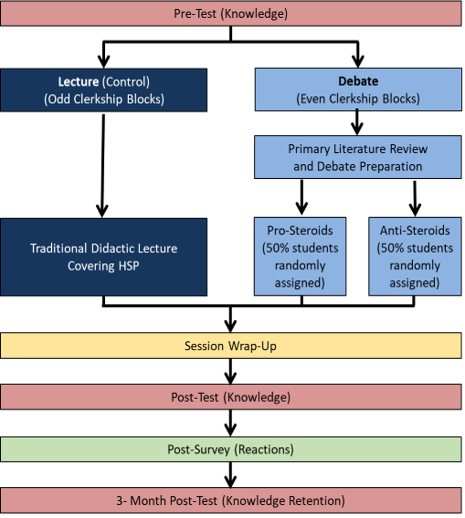Session Information
Date: Sunday, November 10, 2019
Title: Education Poster
Session Type: Poster Session (Sunday)
Session Time: 9:00AM-11:00AM
Background/Purpose: Medical students at Vanderbilt receive approximately 25 hours of didactic teaching during their pediatric clerkship. Debate format educational sessions employ active learning principles allowing students opportunities to critically evaluate and articulate evidence to support claims. The aim of our study was for students to participate in a debate of two treatment options for Henoch-Schönlein Purpura (HScP), and evaluate learning outcomes, student engagement, and satisfaction with debate compared to traditional lecture.
Methods: We compared medical students on their pediatrics clerkship participating in a debate to a control group receiving a traditional lecture. Debate group students received a case of a patient with HScP and abdominal pain a week prior to the session. Half of the students were randomly assigned to argue in favor of treatment with steroids and half against steroid treatment. Students were asked to prepare by performing a review of primary literature and then met during their pediatrics clerkship to participate in the debate. The control group received a traditional lecture about HScP. Both groups received same wrap-up presentation reinforcing key concepts. Students completed an identical multiple-choice pre-test before and post-test after the session and a follow-up post-test three months later to assess knowledge retention. Surveys immediately following and three months after the session assessed satisfaction with and the efficacy of the session in promoting active learning and clinically relevant skills.
Results: Both groups showed improvement between the pre- and post-tests, and there was no significant difference in the groups’ post-test scores (n=48, p=0.06). Retention of information on the three-month post-test was not significantly different between the two groups (n=18, p=0.61). More students in the debate group agreed or strongly agreed that they practiced researching a clinical question (n=21 and 27, 81.5% vs 44.4% respectively) and articulating their opinion (77.8% vs 37.0% respectively). More students in the debate group agreed or strongly agreed that they used the research skills they used in this session in the direct care of a patient on the three-month follow up survey (n=8 and 10, 87.5% vs 50% respectively). Students in the lecture group who reported higher satisfaction or increased engagement scored significantly better on the initial post-test (n=27, p=0.004 and p=0.016, respectively). Satisfaction and engagement did not correlate with initial post-test scores in the debate group (n=21, p=0.46 and p=0.29 respectively).
Conclusion: Students learned core knowledge about HScP in both groups as evidenced by similarly improved scores on immediate and three-month post-tests. Participation in the debate allowed students to practice critically appraising literature and articulating their opinion. Debate students’ immediate post-test scores were less correlated with their perception of engagement or satisfaction with the session. Future sessions will include a debrief session to help students transfer critical appraisal skills to clinical practice. We are interested in utilizing debates to study tolerance of ambiguity in pediatric rheumatology fellows.
To cite this abstract in AMA style:
Dingle J, Graham T, Crook T, Neeley M, Davidson M, Fleming A. Comparison of Debate vs. Lecture to Teach Medical Students Pediatric Rheumatology [abstract]. Arthritis Rheumatol. 2019; 71 (suppl 10). https://acrabstracts.org/abstract/comparison-of-debate-vs-lecture-to-teach-medical-students-pediatric-rheumatology/. Accessed .« Back to 2019 ACR/ARP Annual Meeting
ACR Meeting Abstracts - https://acrabstracts.org/abstract/comparison-of-debate-vs-lecture-to-teach-medical-students-pediatric-rheumatology/

